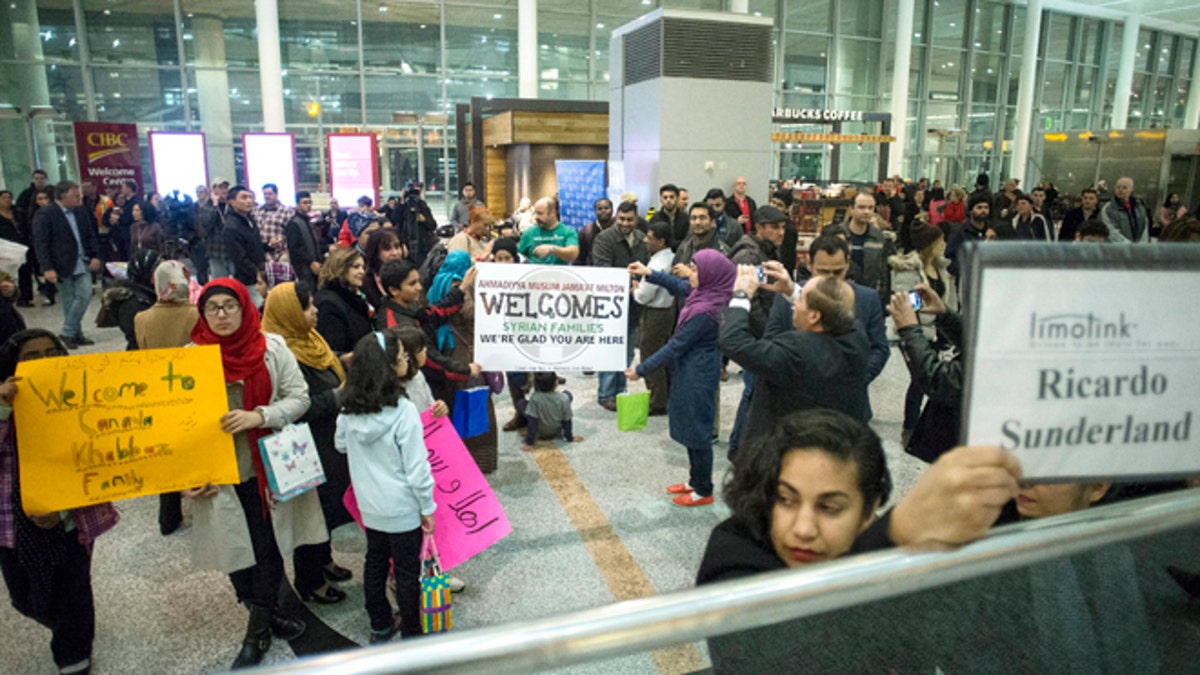
Members of groups who are sponsoring two Syrian refugee families hold up signs welcoming their charges as they wait for the families to arrive at Toronto Pearson International Airport, Wednesday, Dec. 9, 2015, Mississauga, Ontario, Canada. (Chris Young/The Canadian Press via AP) MANDATORY CREDIT
U.S. officials are having a hard enough time vetting Syrian refugees coming to America -- now, Canada's plan to open its borders even wider is stirring additional security concerns.
Canadian Prime Minister Justin Trudeau welcomed the first big wave of Syrian refugees last Friday, part of the more than 10,000 expected to resettle in Canada by the end of the year.
But with the plan come questions about whether their vetting process is up to the task and whether lax standards north of the border could undermine America's security.
“There is a concern with this large volume in such a short period of time that adequate vetting may not be occurring,” Sen. Ron Johnson, chairman of the Senate Homeland Security Committee, told FoxNews.com.
“It is an obvious concern that without robust vetting by Canada, these individuals could represent a threat to America given our porous border.”
Trudeau personally greeted the planeload of Syrian refugees last week telling them “you’re safe at home” while handing out winter coats.
“We get to show the world how to open our hearts and welcome people who are fleeing extraordinarily difficult straits,” Trudeau said as the refugees arrived at the airport.
Under Canada's plan, more than 25,000 refugees will call the country home by the end of February 2016.
The prime minister’s big welcome, though, isn’t sitting well with some who question if Canada is downplaying the risks associated with letting in thousands of refugees from war-torn Syria, ISIS' home base.
“The majority of these refugees, all receiving permanent residence, will settle in Toronto and Montreal – cities in close proximity to the U.S. border,” Marguerite Telford from the Center for Immigration Studies, recently wrote. “How many of these refugees will enter the United States to join the 11 million-plus illegal aliens already here? How many will join terrorist sleeper cells, which we are told exist in all 50 states?”
The White House has largely brushed off security concerns and instead applauded Canada’s humanitarian efforts. It remains unclear, however, how much confidence the Department of Homeland Security has in Canada’s ability to keep would-be jihadists out of the mix.
Requests for comment from DHS were not returned.
On Capitol Hill, Rep. John Katko, R-N.Y., has sounded the alarm for months about gaping holes in the Canada-U.S. border and in October won bipartisan House approval for his National Border Security Act to require a federal review of procedures on the northern border as well as a look into issues with recruiting and retaining border security officials.
For its part, Canadian officials have pledged to beef up the country’s screening process and passed the Anti-terrorism Act of 2015 which gives the government more power to prevent terrorist travel and provides more resources to prevent attacks on its soil. Immigration experts say they aren’t 100 percent convinced the anti-terror tools currently in place will have much of an impact.
“Small tweaks do not alleviate the safety hazards associated with the refugee resettlement program,” Telford said, adding that Canada does not have access to databases in the U.S. that detect criminal background or terrorist links.
A new report from Johnson’s committee calls out Canada’s rushed refugee plan and exposes weaknesses in the system.
“There is currently no fencing on the northern border,” the report says. “Instead, the demarcation line between the two countries is often marked by a ditch, approximately six inches deep.”
The report also includes testimony from experts who caution that if someone with questionable intentions gets into Canada, they will be able to enter the United States with relative ease.
A May 2015 investigation by CBC News revealed that most of the people who arrive at Canadian border crossings each month aren’t fully screened against the country’s major police database. The processing time for most travelers is less than a minute by front-line border agents who don’t have access to the database.
Further, figures obtained by FoxNews.com show the number of Syrians who have entered the U.S. over the past three years is much larger than previously reported. From 2012 through August 2015, 102,313 Syrians have been given the green light to enter the U.S. A government official said that of those, half are now legal permanent residents while the others came here on visas.
Johnson says while the U.S. and its northern neighbor have always had a “strong working relationship,” Congress should continue to “press the Canadian government to share more information on the Syrian refugees it plans to resettle in North America.”











































